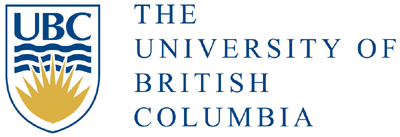
The Exercise Oncology Lab (EOL) is dedicated exclusively on developing, assessing, and evaluating exercise studies in cancer survivors. It is a multi-purpose laboratory allowing the space to be transformed for a variety of intervention modalities (e.g., distance-based, supervised), as well as physical function and exercise testing.
Mission: to promote physical activity as an essential component in cancer control and survivorship.
We focus on a variety of research questions including:
- Can exercise help manage treatment-related side effects?
- What is the role of exercise for cognitive functioning?
- What is the optimal exercise program for benefits?
- How do we maintain exercise levels throughout the cancer care continuum?

Current Studies
A Distance-Based Randomized Controlled Trial for Sedentary Behaviour Among Prostate Cancer Survivors
The purpose of this study is to determine the effects of a 12-week intervention (Fitbit + behvioural counselling) vs. Fitbit-only control group in reducing sedentary behaviour among prostate cancer survivors.
Cardiorespiratory Fitness and Cognitive Function Patterns in Metastatic Kidney Cancer Survivors
The purpose of this study is to examine the association between physical fitness and cognitive function in metastatic kidney cancer survivors receiving immunotherapy to develop tailored physical activity programs.
BOOST-Up: Behaviour Change For Cancer Survivors Trial
The purpose of this study is to help adults diagnosed with cancer increase their physical activity levels through a 24-week virtual program, allowing them to enjoy the benefits of being active from the comfort of their own home.
Facilities
The Exercise Oncology Lab is funded by the Canada Foundation for Innovation (CFI) and is dedicated exclusively to developing, assessing, and evaluating behaviour change interventions in cancer survivors. The Exercise Oncology Lab contains four suites with the Exercise Suite as the main space, which houses the exercise training and testing space to enable the development and testing of exercise interventions. This space is also equiped with objective measures for exercise and sedentary behaviour including Actigraph accelerometers and Activpal inclinometers. The Behavioural Counselling Suite is used for behavioural counselling sessions necessary for long term exercise maintenance. The Analysis Suite contains data processing and analysis software used in behavioural interventions. The Biomarker Suite (directed by Dr. Daniel Santa Mina) is a wet lab dedicated to understanding the mechanisms between exercise and cancer- and treatment-related symptoms.
News & Events
Canadian Association of Psychosocial Oncology (CAPO) Annual Meeting, 2025
Deema Khalaf (MSc. candidate) presents her research on 'A Habit-based Intervention to Reduce Sedentary Behaviour in Cancer Survivors: A Feasibility Study Protocol' at the Canadian Association of Psychosocial Oncology (CAPO) Annual Meeting in Toronto, Canada.
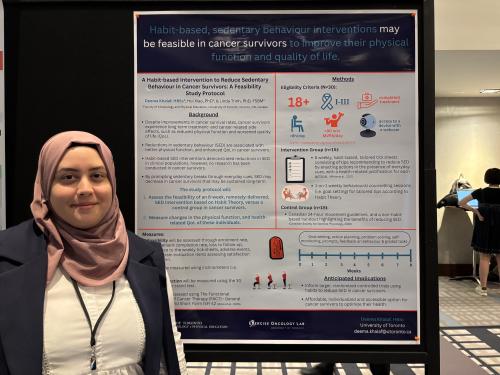
Society of Behavioural Medicine (SBM) Annual Meeting, 2025
Hui Xiao (Post-Doctoral Fellow) presents his research on 'Identifying Latent Profiles of Quality of Life and Lifestyle Behaviours in Cancer Survivors: The Interplay of Sedentary Behaviour, Physical Activity and Sleep' at the Society of Behavioural Medicine (SBM) Annual Meeting in San Francisco, United States.
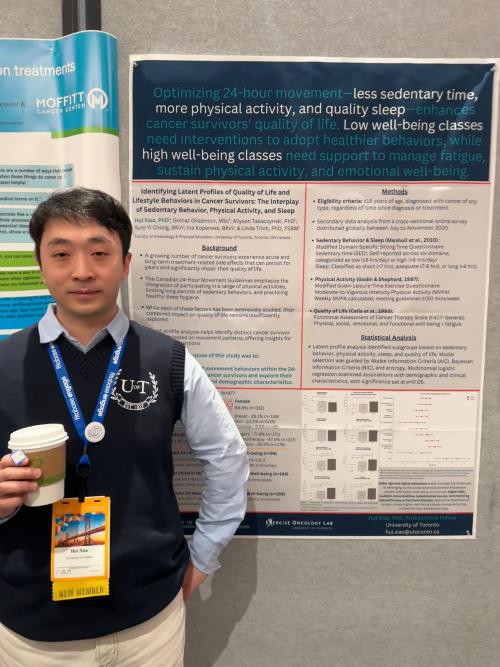
Resources for Cancer Survivors
These resources may be helpful if you are a cancer survivor and/or caregiver. Maintaining a healthy lifestyle through exercise and good nutrition is an important step in the journey to recovery.
Healthy Lifestyle Guidelines for Cancer Survivors
Nutrition and Physical Activity Guidelines for Cancer Survivors by the American Cancer Society (ACS)
Physical Activity Guidelines for Cancer Survivors by the American College of Sports Medicine (ACSM)
American Institute for Cancer Research’s (AICR) Guidelines For Cancer Survivors
Exercise for People with Cancer by Cancer Care Ontario
Cancer Prevention Recommendations from the World Cancer Research Fund (WCRF)
Exercise Guidebook for Kidney Cancer Survivors (copyrighted)
Get Active, Sit Less! Exercise Guidebook for Kidney Cancer Survivors© in PDF format. This guide book is designed to help kidney cancer survivors increase their physical activity and reduce their sitting time. Download document with this link: Kidney Cancer Guidebook (English) or Kidney Cancer Guidebook (French)
Researchers and practitioners wishing to use this guidebook for research or practice-related purposes, please contact Dr. Linda Trinh: linda.trinh@utoronto.ca
There is no need to contact Dr. Trinh if you are downloading the book for your personal use.
Participate in Current Studies at the Exercise Oncology Lab
Please contact the Exercise Oncology lab at exercise.oncology@utoronto.ca or (416) 946-5856 if interested in participating in the current studies.
The Exercise Oncology Lab is currently recruiting adults (aged +18) living with and beyond cancer interested in increasing their physical activity levels through a 24-week virtual program.
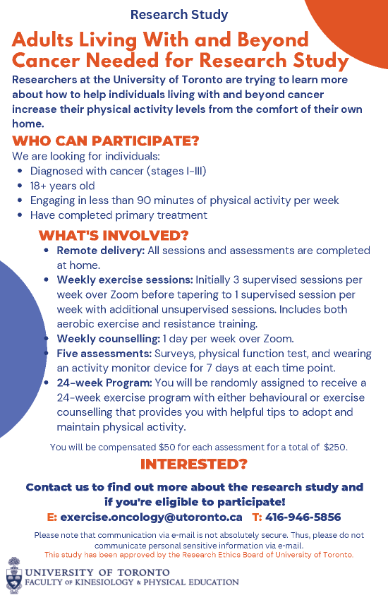
Join
Graduate students
The EOL is currently recruiting highly motivated graduate students at the MSc and PhD level. Please contact Dr. Linda Trinh (linda.trinh@utoronto.ca) with a CV and cover letter outlining your research interests in exercise oncology.
Undergraduate students
If you are interested in a research experience with the EOL, please contact Dr. Linda Trinh (linda.trinh@utoronto.ca) with a resume and brief paragraph outlining your interest in exercise and cancer.
Want to hear about a day in the life at the EOL? Read an excerpt by one of the undergraduate students in our lab.
Contact Us
The Exercise Oncology Laboratory (EOL) is located in the Warren Stevens Building at the University of Toronto.
55 Harbord Street, Toronto ON.
M5S 2W6
Telephone: 416-946-3624
Scientific Team
Principal Investigator
Staff
Emma Tung (MSc.; University of Waterloo)

Emma Tung is a researcher in sports and clinical biomechanics. She completed her Master's at the University of Waterloo in Biomechanics and her research looked at using muscle quality, and physical capacity indicators to measure frailty in older adults. For two years, Emma worked for the Texas Rangers MLB organization where she led research activities to improve player performance. Now, as a Research Officer for the EOL, Emma is excited to coordinate and organize current and future studies looking at how specific exercise and behavioural interventions affect cancer survivorship and quality of life.
Golnaz Ghazinour (MSc. ; University of Toronto)

Golnaz Ghazinour is a research officer at the Exercise Oncology Lab at the University of Toronto. She graduated from the University of Toronto with a Master of Science and Bachelor's degree in Kinesiology and Physical Education. Her research focus was understanding the role of sedentary behaviour in cognitive function of older breast cancer survivors post-treatment. She hopes to use her findings to develop effective physical activity interventions to reduce sedentary behaviour and improve the well-being of cancer survivors.
Post-Doctoral Fellow
Hui Xiao (Ph.D.; University of Otago)

Hui is an emerging cancer rehabilitation researcher, with leadership in the field of prostate cancer prevention through exercise-supportive adjuvant therapy. His work combines quantitative and qualitative methodologies to bridge public health with men's health, driving forward effective prostate cancer research initiatives. He has previously delved into the supportive care needs of men with prostate cancer and pioneered a novel healthy ageing model for men by examining the factors that shape their supportive care needs and healthy ageing capabilities. Hui's interests are across interdisciplinary areas, including public health, exercise science, health rehabilitation, translational health, men's health, and cancer survivorship research.
Graduate Students
Alexis Whitehorn (Ph.D. Candidate; University of Toronto)
Alexis Whitehorn graduated from the University of Toronto with a Master of Science in Kinesiology and previously from the University of Illinois at Urbana-Champaign with a Bachelor of Science in Kinesiology in 2018. She is currently working in the Exercise Oncology Lab as a first year PhD student at the University of Toronto. Her research interest involves home-based functional fitness testing with cancer survivors. Alexis is committed to owning her own personal training studio in the future. She plans to motivate clients to become physically active and maintain a healthier lifestyle.
Michelle Ha (H.BSc.; University of Toronto)

Michelle is a second-year Master’s student with a Bachelor of Science from the University of Toronto. Since joining the Exercise Oncology Lab in 2021, she has focused her research on the long-term maintenance of physical activity habits, gender-specific factors influencing these habits, and the impact of sedentary behavior. With experience working with both sedentary and clinical populations, Michelle is passionate about developing tailored interventions that promote sustainable physical activity habits and lifestyle changes. Her work reflects a dedication to improving health outcomes through personalized and evidence-based approaches.
Sarah O'Rourke (BA.; University of Western Ontario)

Sarah O’Rourke is a PhD student working in the Exercise Oncology Lab at the University of Toronto. She graduated from Western University with a Bachelor of Arts in Kinesiology. Sarah is interested in the role of resistance training in cognitive and physical function of prostate cancer survivors. She hopes to use her findings to develop effective exercise interventions to improve quality of life and health outcomes of cancer survivors.
Jack Zhan (MSc.; University of British Columbia)

Jack is a first-year PhD student with a Master of Science from the University of British Columbia, and a Bachelor of Kinesiology from the University of Toronto. His Master’s work focused on developing and assessing a mobile health intervention to increase adherence to the 24-Hour Movement Guidelines. He is hoping to incorporate the 24-Hour Movement Guidelines into cancer care and take a whole day approach to improving the lives of cancer survivors.
Deema Khalaf (BSc.; McMaster University)
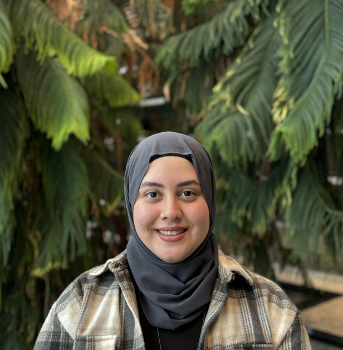
Deema Khalaf is a second year Master’s student working in the Exercise Oncology Lab at the University of Toronto. She graduated from McMaster University with a Bachelor of Science in Kinesiology. Deema is interested in developing interventions grounded in behaviour change theories to help reduce sedentary behaviour amongst those living with and beyond cancer. She hopes to use her findings to improve health outcomes and the quality of life of those living with and beyond cancer.
Sara Addetia (BKin.; University of Toronto)

Sara Addetia is a first-year master’s student in the Exercise Oncology Lab at the University of Toronto. She completed her Bachelor of Kinesiology at the University of Toronto and is passionate about supporting individuals living with, and beyond, cancer. Her research focuses on developing interventions informed by behaviour change theories that can empower cancer survivors, while improving quality of life and health outcomes. Sara strives to use her research to create meaningful change, helping people live healthy and happy lives.
Cinithia Orellana (BKin.; University of Toronto)

Cinthia Orellana is a first-year Master of Science student working in the Exercise Oncology lab
at the University of Toronto. She graduated with a Bachelor of Kinesiology & Physical Education
from U of T and is passionate about sedentary behaviour in cancer survivors, with an emphasis
on understanding the barriers and facilitators that shape sedentary time to help inform strategies for healthier, more active survivorship. She hopes her work will contribute to evidence-based interventions that improve quality of life and long-term health outcomes for cancer survivors.
Research Assistants
Lamisa Syed (MSc.; University Of Toronto)
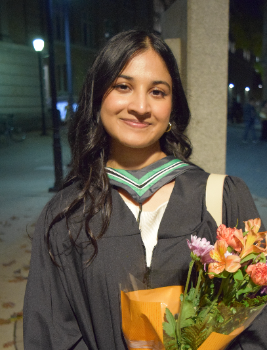
Lamisa Syed is a research assistant at the Exercise Oncology Lab. She holds a Bachelor of Science degree from McMaster University and a Master’s of Science in Occupational Therapy from the University of Toronto. In addition to her role in the lab, Lamisa is currently working as a registered Occupational Therapist in rehabilitation settings. With a passion for integrating clinical skills and evidence-based practices, Lamisa hopes to support cancer survivors return to their most meaningful activities and enhance their quality of life through physical activity.
Jada Roach (BSc.; University of Toronto)
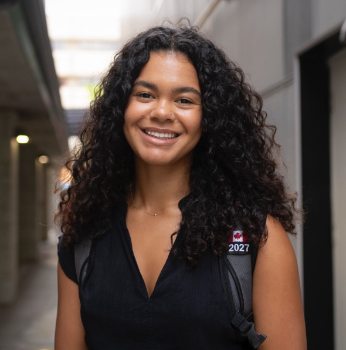
Jada Roach is a recent graduate with a Bachelors of Kinesiology and a current second-year medical student at the University of Toronto. She is currently working in the Exercise Oncology lab as a research assistant. She is passionate about promoting the benefits of exercise for people of all walks of life and is specifically interested in how having an exercise identity impacts behaviour in cancer survivors.
Ina Koperwas (BSc.; University of Toronto)
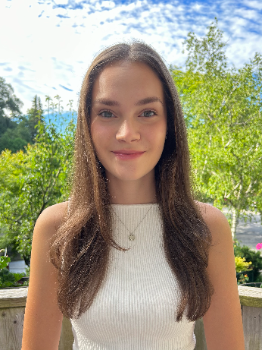
Ina Koperwas is a research assistant working in the Exercise Oncology Lab. She is a recent graduate with a Bachelors of Kinesiology and Physical Education from the University of Toronto and is currently a second year Nursing student also at the University of Toronto. Ina is passionate about exploring how reducing sedentary behavior can enhance the overall quality of life and decrease comorbidities in cancer survivors.
Sam Sharifi (BSc.; University of Toronto)
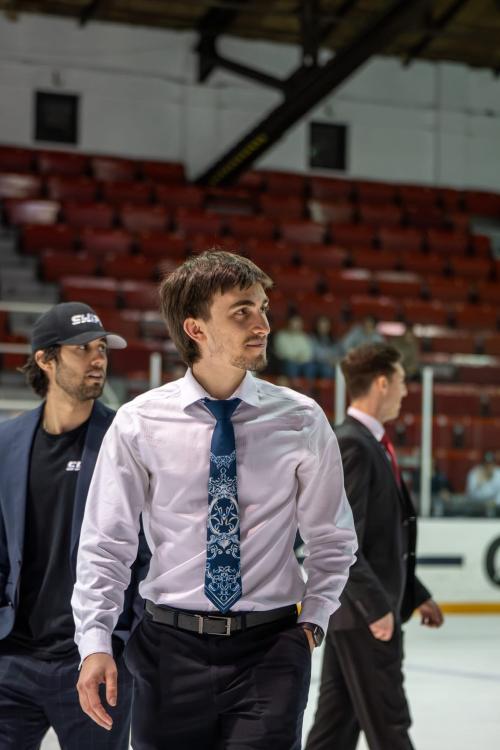
Sam is a Master's candidate in the Professional Kinesiology program at the University of Toronto, where he works as a coach, personal trainer, and fitness instructor at the Exercise Oncology Lab. He is passionate about creating engaging and effective programs that promote both learning and enjoyment. With a strong focus on exercise as medicine, Sam actively applies his knowledge in real-world settings, continuously refining his expertise. His energy and enthusiasm drive him to empower others to become their healthiest selves.
Andy (Tsz Chung) Yip (University of Toronto)
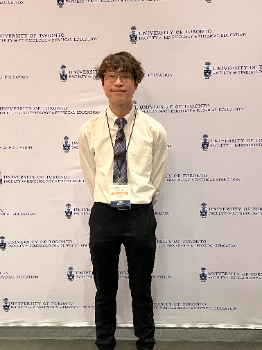
Andy is a second-year undergraduate student in the Faculty of Kinesiology and Physical Education at the University of Toronto. He is currently a research assistant at the Exercise Oncology Lab. Andy is particularly passionate about the effects of physical activity and sedentary behavior on the quality of life of cancer survivors. His interests lie in exploring evidence-based exercise interventions to optimize health and well-being among cancer survivors.
Stacey Li (University of Toronto)
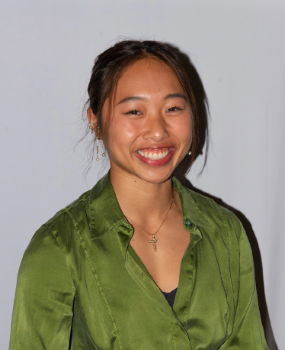
Stacey is a second-year undergraduate student at the Faculty of Kinesiology and Physical Education, University of Toronto, currently working as a research assistant at the Exercise Oncology Lab (EOL). She is deeply interested in the benefits of exercise for cancer survivors. Stacey’s passions also include exploring women’s health, geriatrics, and the role of lifestyle changes in fostering long-term well-being. With experience in rehabilitation, she aims to help individuals achieve their optimal health and functionality.
Adam Esmail (Brock University)

Adam is a third-year undergraduate student studying Kinesiology at Brock University. He began his studies at the University of Toronto, where he developed a strong interest in the intersection between exercise and cancer treatment. Since then, he has been working as a Research Assistant in the Exercise Oncology Lab, contributing virtually.
Registered Kinesiologist
Monica Antunes (MPK.; University of Toronto)
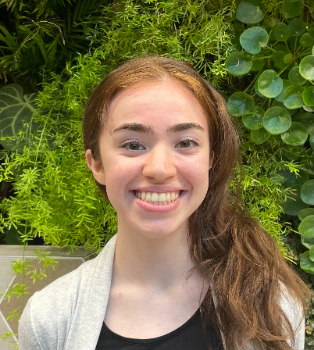
Monica is a Registered Kinesiologist at the Exercise Oncology Lab and a recent graduate of the Master’s of Professional Kinesiology program at the University of Toronto. She earned her Bachelors of Science in Kinesiology and Health Sciences at York University. Monica is passionate about cardiovascular and cognitive health. She is also a registered kinesiologist and aspires to promote physical activity in oncology and chronic populations.
University of Toronto alumni
Christy Chong, BSc (2020- 2024)
Golnaz Ghazinour, MSc (2022-2025)
Allyson Tabaczynski Ph.D. (2020-2024)
Natalie Cuda, MSc (2021-2024)
Lauren Voss, PhD Candidate (2021-2023)
Lucas Arago, BKin (2021-2022)
Alyssa Neville, MSc (2020-2022)
Sarah Ryan, BKin (2021-2022)
Adam Di Salvo, BKin (2020-2021)
Denise Bastas, MSc (2019-2021)
Shumeng Duan, BKin (2019-2020)
Cherry Manzano, BKin (2019-2020)
Princess Ulona, BKin (2018-2019)
Marlena Petrakis, BKin (2018-2019)
University of Illinois Graduate AlumnI
Dominick Strom, MSc (2017-2018)
Jaime Wong, MSc (2016-2018)
University of Illinois underGraduate AlumnI
Joshua Lee, BSc (Winter 2018)
Ashley Raehsler, BSc (Winter 2018)
Marianna Zalova, BSc (Winter 2018)
Maddie Forouhi, BSc (2017-2018)
Madeline Gagnon, BSc (2017-2018)
Sophia Kim, BSc (2017-2018)
Jacqueline Surd, BSc (2017-2018)
Samantha Gibbons, BSc (2015-2018)
Waleed Aldadah, BSc (2016-2017)
Adrian Tellez, BSc (2016-2017)
Michelle Wilson, BSc (2016-2017)
Collaborators





